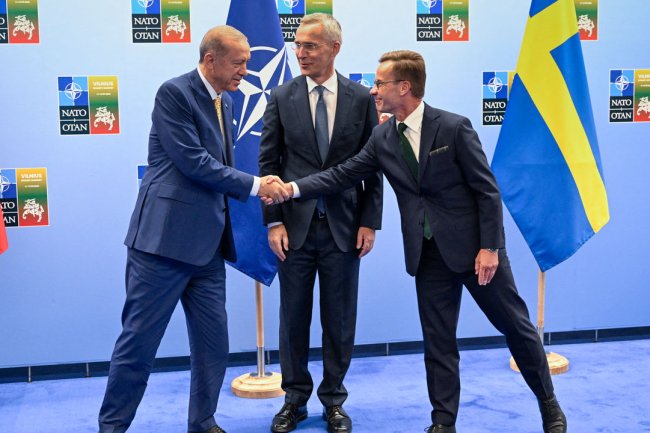A Trillion-Dollar Opportunity: China’s Pivot to the Middle East Set to Fuel Investment Boom
Middle Eastern sovereign-wealth funds have a lot of money to invest. More of it is set to go to Chinese businesses. The increasing economic links between China and the Middle East show the challenges that will face the U.S. as it navigates the region. fayez nureldine/Agence France-Presse/Getty Images fayez nureldine/Agence France-Presse/Getty Images By Elaine Yu July 7, 2023 5:30 am ET China’s increasing political clout in the Middle East is fueling a push to develop more economic ties. A key part of that: billions of dollars being invested in Chinese businesses. Chinese leader Xi Jinping visited Saudi Arabia in December, meeting Saudi Crown Prince Mohammed bin Salman as officials and business


China’s increasing political clout in the Middle East is fueling a push to develop more economic ties. A key part of that: billions of dollars being invested in Chinese businesses.
Chinese leader Xi Jinping visited Saudi Arabia in December, meeting Saudi Crown Prince Mohammed bin Salman as officials and business executives from the two countries signed a series of agreements that could be worth around $50 billion. Earlier this year, Beijing brokered a diplomatic breakthrough between Saudi Arabia and Iran, a rare move by China to directly intervene in the region. In the wake of political deals, business deals have followed.
Saudi Aramco, the state-owned oil giant, is planning to invest $3.6 billion in Rongsheng Petrochemical, a Hangzhou-based company. Saudi Arabia’s investment ministry has signed deals that include putting $5.6 billion into a joint venture with Human Horizons, a Chinese electric-vehicle company. An Abu Dhabi government-backed entity has bought a stake valued at more than $730 million in NIO, another EV maker from China.

Chinese leader Xi Jinping visited Saudi Arabia in December, meeting Saudi Crown Prince Mohammed bin Salman.
Photo: Bandar Algaloud/Saudi Royal Cour/VIA REUTERS
At the Arab-China Business Conference in Riyadh in June, the head of Hong Kong’s stock exchange predicted that the Middle East’s biggest sovereign-wealth funds could allocate between $1 trillion and $2 trillion of their investments to China by 2030.
The increasing economic links between China and the Middle East show the challenges that will face the U.S. as it navigates the oil-rich region in the coming decades. Saudi Arabia, which has had an occasionally strained relationship with the U.S. over the past few years, is attempting to expand its roster of allies. That has created an opportunity for China, the world’s largest importer of oil, to turn its economic clout into political capital—and vice versa.
But analysts also think the opportunities for Middle Eastern investors in China are natural, even leaving aside the politics. Nicolas Aguzin, the Hong Kong stock exchange head, said the big sovereign-wealth funds only invest 1% to 2% of their assets in China at the moment. He thinks that will grow 10-fold.
“First, the relationship between the U.S. and the Gulf Cooperation Council has regressed, so they’re investing less into the U.S.,” said Ethan Chan, chairman of Hong Kong-based asset manager ARTE Capital Group, referring to a loose political and economic union in the Middle East. “Second, their allocation to China isn’t high enough.”

SenseTime signed agreements in Saudi Arabia to explore partnerships to develop digital-tourism and smart-city projects.
Photo: THOMAS PETER/REUTERS
A sovereign-wealth fund Chan works with in the United Arab Emirates currently invests around 7% of its entire portfolio in Chinese assets, a fifth of what it invests in the U.S. The fund would be comfortable doubling its China investments, or going even further, Chan said.
Middle Eastern capital has already proved a useful alternative for Chinese companies that are cut off from the U.S. financial system.
SenseTime, a Hong Kong-based artificial intelligence company blacklisted by the U.S., signed agreements in Saudi Arabia earlier this year to explore partnerships to develop digital-tourism and smart-city projects in the kingdom. The company first started doing business in Saudi Arabia in 2018, including signing a joint venture with the Public Investment Fund, the sovereign-wealth fund.
Mubadala, Abu Dhabi’s sovereign-wealth fund, has been an investor in Chinese artificial-intelligence company 4Paradigm since at least 2021, according to S&P Global Market Intelligence. The U.S. added 4Paradigm to its export control list in March.
The links between China and the Middle East are also creating opportunities in the other direction, with Hong Kong or mainland Chinese architects, construction companies and tech firms signing or negotiating deals with Middle Eastern officials trying to transform their oil-dependent economies into more sustainable smart cities.

Huawei has been growing its business in the Middle East.
Photo: Wang Haizhou/Zuma Press
Chinese telecom giant Huawei Technologies found itself at the forefront of the U.S.-China tech battle almost five years ago, after accusations that it violated sanctions on Iran led to its chief financial officer fighting extradition from Canada—creating a diplomatic incident involving all three countries before a deal was struck in late 2021. But Huawei has been steadily growing its business in the Middle East, including helping the U.A.E. build the first 5G network in the Gulf region, said Jiawei Liu, the company’s chief executive in the emirates. Huawei has also signed deals with Saudi Arabia’s state-owned telecoms company.
The growing relations between China and the Middle East are also good news for Hong Kong, which has advantages that appeal to executives from both areas. Hong Kong’s chief executive, John Lee, led a delegation to Saudi Arabia in February, courting the state-owned oil giant Aramco to sell shares on Hong Kong’s stock exchange. Senior bankers and executives joined the delegation.
Dubai Chambers, a nonprofit government entity, is opening an office in Hong Kong after setting one up in the neighboring mainland city of Shenzhen. The organization wants to expand Dubai’s presence in Asia, and help companies in Hong Kong learn more about Dubai and find partners there.
Write to Elaine Yu at [email protected]
What's Your Reaction?

















